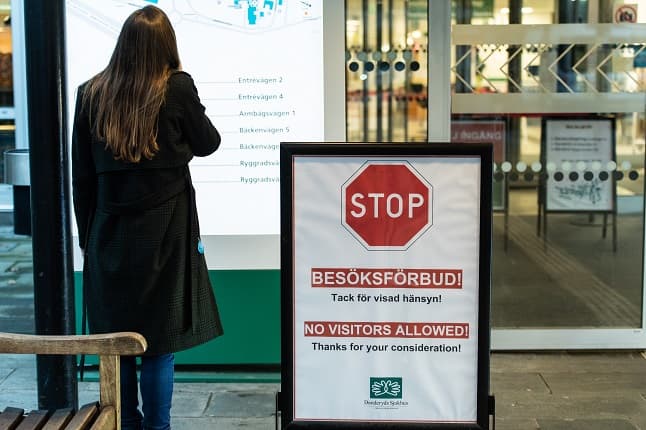Stockholm and Skåne postpone all planned care

The two major Swedish regions of Stockholm and Skåne have both been forced to postpone non-emergency care as the healthcare sector works hard to cope with a surge in coronavirus cases.
"We will manage emergency care, we will manage Covid care. But this will happen at the expense of other healthcare," Skåne's regional director Alf Jönsson told a press conference on Wednesday morning.
There are currently more than 400 people in the region's hospitals receiving care for the coronavirus: 31 in intensive care units and 372 on other wards. Meanwhile, the test positivity rate for self-tests for the coronavirus has reached 25 percent, showing how wide the spread of the virus is.
Jönsson said the region would be cancelling planned non-emergency care in order to cope with the extra burden on the healthcare sector, and called on everyone to be especially careful both to avoid catching and spreading the virus and to avoid other accidents.
"Six out of ten accidents lead to hospitalisation. It is not the time to climb a ladder to change a light bulb. Or take out the motorcycle in the mild winter weather. Rather, it is important to make sure that no one slips or falls indoors or outdoors," he said.
It comes the day after the Stockholm region said it would be postponing all non-urgent care until at least January 31st, 2021, as around 800 people were receiving Covid-19 care at the region's hospitals.
"This might mean that those who need, for example, a hip operation have to wait, even though their hip is in pain," regional healthcare director Björn Eriksson said. "My duty now is to do everything I can to relieve and help staff. We have to retain quality, and they have to keep going for weeks, months."
As well as the postponement of some care, Eriksson announced some other changes. These included that some essential care will take place in other locations than hospitals, a reduction of healthcare administrative work including meetings, and patients would only be transferred to or from the region if for essential care.
Comments
See Also
"We will manage emergency care, we will manage Covid care. But this will happen at the expense of other healthcare," Skåne's regional director Alf Jönsson told a press conference on Wednesday morning.
There are currently more than 400 people in the region's hospitals receiving care for the coronavirus: 31 in intensive care units and 372 on other wards. Meanwhile, the test positivity rate for self-tests for the coronavirus has reached 25 percent, showing how wide the spread of the virus is.
Jönsson said the region would be cancelling planned non-emergency care in order to cope with the extra burden on the healthcare sector, and called on everyone to be especially careful both to avoid catching and spreading the virus and to avoid other accidents.
"Six out of ten accidents lead to hospitalisation. It is not the time to climb a ladder to change a light bulb. Or take out the motorcycle in the mild winter weather. Rather, it is important to make sure that no one slips or falls indoors or outdoors," he said.
It comes the day after the Stockholm region said it would be postponing all non-urgent care until at least January 31st, 2021, as around 800 people were receiving Covid-19 care at the region's hospitals.
"This might mean that those who need, for example, a hip operation have to wait, even though their hip is in pain," regional healthcare director Björn Eriksson said. "My duty now is to do everything I can to relieve and help staff. We have to retain quality, and they have to keep going for weeks, months."
As well as the postponement of some care, Eriksson announced some other changes. These included that some essential care will take place in other locations than hospitals, a reduction of healthcare administrative work including meetings, and patients would only be transferred to or from the region if for essential care.
Join the conversation in our comments section below. Share your own views and experience and if you have a question or suggestion for our journalists then email us at [email protected].
Please keep comments civil, constructive and on topic – and make sure to read our terms of use before getting involved.
Please log in here to leave a comment.